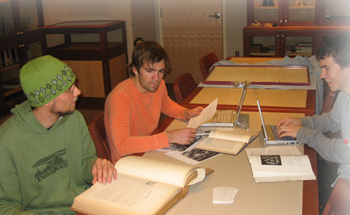News Archives - 2007
People and Nature in Augsburg's Past
 Too often, historians overlook the crucial role played by the physical world in the human past. Last fall, students in "Environmental History" (HIS 316) not only learned about the significance of nature in U.S. history, but also applied new perspectives and questions to a semester-long project on the environmental history of Augsburg College.
Too often, historians overlook the crucial role played by the physical world in the human past. Last fall, students in "Environmental History" (HIS 316) not only learned about the significance of nature in U.S. history, but also applied new perspectives and questions to a semester-long project on the environmental history of Augsburg College.
Using on-campus archives as well as collections at the Minneapolis Public Library, the Minnesota Historical Society, and the University of Minnesota, the nine students examined the history of Augsburg's landscape, the history of waste, water, and energy flows in and out of campus buildings, the history of spatial relationships forged by social interactions on and off-campus, and the history of environmental awareness at the college. In the words of Alex Hoselton '08, they "asked new questions about our history."
With those questions in mind, Spencer Power '07 learned that history could push "students to expand on their own ideas about the environment." Focusing on human-nature relationships and how they changed over time, the class unearthed an entirely different history of the place where they live and learn. By project's end, Emily Jensen '08 reflected that "the comprehensive class effort in writing the environmental history was challenging, but…also fun."
In a report over eighty pages long, the students drew important conclusions about the ways in which the college community has envisioned and shaped the environment and how ecological relationships have, knowingly or not, shaped Augsburg. It "motivates me to do more for the institution in my remaining time here," said history major Alex Ubbelohde '07. He's convinced that examining the college's environmental history "allowed me to look with a more critical eye at conditions on the campus today, and given me deeper meaning for what it means to be a student at Augsburg."
Following up on this link between Augsburg's past and present, the class will soon present its findings to President Pribbenow and other administrators in order to strengthen environmental stewardship at the college.